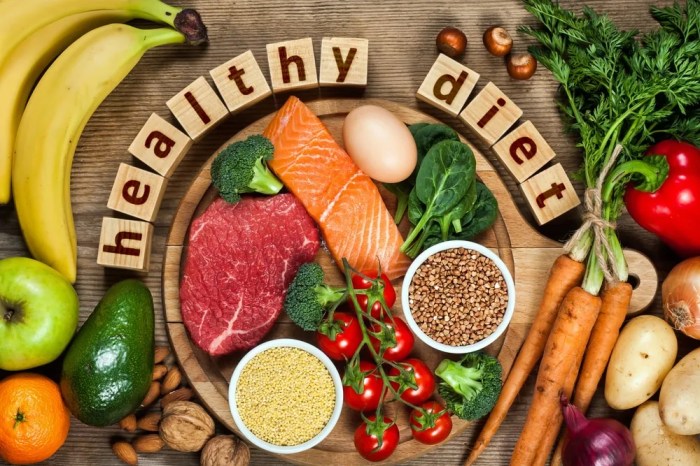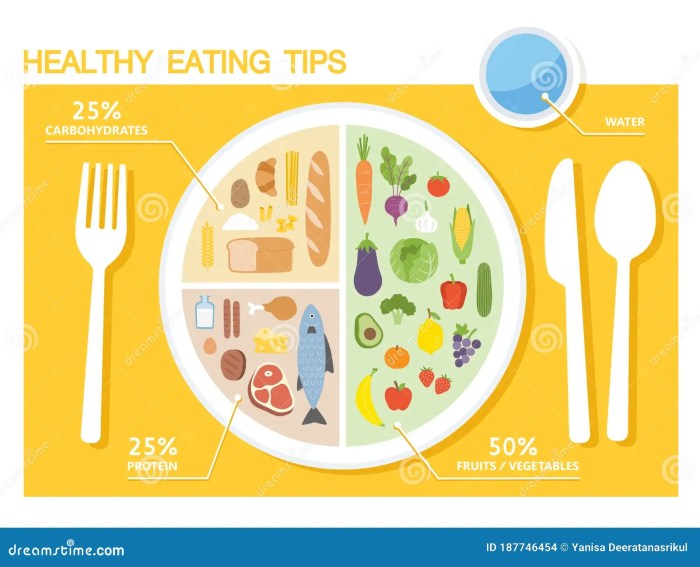Balanced Diet Tips takes the spotlight, offering a fresh take on eating right. Dive into a world of nutrition and wellness, where good choices reign supreme.
Get ready to explore the essentials of a balanced diet and unlock the secrets to a healthier lifestyle.
Importance of a Balanced Diet
Maintaining a balanced diet is essential for overall health and well-being. It ensures that our bodies receive the necessary nutrients to function optimally and stay healthy.
Nutrients Needed for a Balanced Diet
- Proteins: Essential for growth and repair of tissues.
- Carbohydrates: Provide energy for daily activities.
- Fats: Important for energy storage and absorption of vitamins.
- Vitamins and Minerals: Support various bodily functions and help prevent deficiencies.
Impact of a Balanced Diet on Energy Levels
A balanced diet helps regulate blood sugar levels, providing a steady source of energy throughout the day. By consuming a variety of nutrients, the body can efficiently convert food into energy, improving overall vitality and reducing fatigue.
Benefits of Maintaining a Balanced Diet
- Weight Management: Helps in maintaining a healthy weight and reducing the risk of obesity-related diseases.
- Improved Immune Function: Supports a strong immune system, reducing the likelihood of infections and illnesses.
- Enhanced Mental Clarity: Proper nutrition can boost cognitive function and contribute to better focus and concentration.
- Reduced Risk of Chronic Diseases: A balanced diet can lower the risk of conditions like heart disease, diabetes, and certain cancers.
Components of a Balanced Diet
Eating a balanced diet is essential for maintaining good health and overall well-being. A balanced diet consists of a variety of nutrients that are necessary for the body to function properly.
Major Food Groups in a Balanced Diet
When planning a balanced diet, it is important to include foods from all the major food groups:
- Fruits and Vegetables: Rich in vitamins, minerals, and fiber
- Grains: Provide carbohydrates for energy
- Protein: Essential for building and repairing tissues
- Dairy: Good source of calcium and vitamin D
- Fats: Healthy fats are important for brain function and cell growth
Role of Carbohydrates, Proteins, Fats, Vitamins, and Minerals
Each component plays a crucial role in maintaining overall health:
- Carbohydrates: Main source of energy for the body
- Proteins: Building blocks for muscles, organs, and immune system
- Fats: Essential for absorbing certain vitamins and hormone production
- Vitamins: Important for various bodily functions and overall health
- Minerals: Necessary for proper growth, development, and maintaining bodily functions
Importance of Portion Control
Portion control is key to a balanced diet to ensure you are not overeating or consuming too little of essential nutrients. It helps in maintaining a healthy weight and preventing health issues related to overconsumption.
Examples of Balanced Meals, Balanced Diet Tips
Here are some examples of meals that represent a balanced diet:
| Meal | Components |
|---|---|
| Grilled Chicken Salad | Protein from chicken, vitamins and fiber from vegetables, healthy fats from dressing |
| Quinoa and Black Bean Bowl | Protein from beans, carbohydrates from quinoa, vitamins from vegetables |
| Salmon with Sweet Potato and Broccoli | Omega-3 fatty acids from salmon, carbohydrates from sweet potato, minerals from broccoli |
Tips for Achieving a Balanced Diet

Eating a balanced diet is essential for overall health and well-being. Here are some tips to help you achieve a balanced diet:
Meal Planning Strategies
- Plan your meals ahead of time to ensure you include a variety of nutrients.
- Include a mix of fruits, vegetables, whole grains, lean proteins, and healthy fats in each meal.
- Avoid skipping meals to prevent overeating later in the day.
Moderation in Food Choices
- Practice portion control by using smaller plates and being mindful of serving sizes.
- Avoid highly processed foods high in added sugars, salt, and unhealthy fats.
- Indulge in your favorite treats occasionally, but in moderation.
Incorporating Fruits and Vegetables
- Add fruits and vegetables to every meal, aiming for a variety of colors to ensure a range of nutrients.
- Snack on fruits and vegetables throughout the day instead of reaching for processed snacks.
- Experiment with different cooking methods like roasting, steaming, or grilling to keep meals interesting.
Significance of Hydration
- Drink plenty of water throughout the day to stay hydrated and support proper digestion.
- Avoid sugary drinks and opt for water, herbal teas, or infused water for added flavor.
- Include hydrating foods like cucumber, watermelon, and leafy greens in your meals.
Benefits of a Balanced Diet: Balanced Diet Tips

Eating a balanced diet goes beyond just fulfilling hunger; it provides numerous benefits that contribute to overall well-being.
Supporting Weight Management
Maintaining a balanced diet can help in managing weight effectively. By consuming a variety of nutrient-dense foods in appropriate portions, individuals can regulate calorie intake and prevent excessive weight gain.
Reducing the Risk of Chronic Diseases
A balanced diet rich in fruits, vegetables, whole grains, lean proteins, and healthy fats can lower the risk of chronic diseases such as heart disease, diabetes, and certain types of cancer. These foods provide essential nutrients and antioxidants that support a healthy immune system and reduce inflammation in the body.
Improving Mental Clarity and Mood
The nutrients obtained from a balanced diet play a crucial role in brain function and mood regulation. Consuming foods rich in omega-3 fatty acids, vitamins, and minerals can enhance cognitive function, improve focus, and stabilize mood. This can lead to better mental clarity, increased productivity, and reduced risk of depression.
Athletes Following a Balanced Diet
Athletes understand the importance of fueling their bodies with the right nutrients to achieve peak performance. Examples of athletes who prioritize a balanced diet include Serena Williams, who focuses on lean proteins and complex carbohydrates for sustained energy, and Tom Brady, known for his high intake of fruits, vegetables, and lean proteins to support muscle recovery and endurance.
